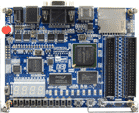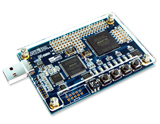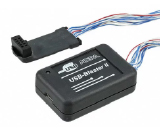- MAX 10 10M50DAF484C7G Device
- Accelerometer and 4-bit Resistor VGA
- 64MB SDRAM, x16 bits data bus
- Arduino UNO R3 and 2x20 GPIO connector
- On-Board USB Blaster (Normal type B USB)
- Cyclone III EP3C16F484 with ~16,000 LEs
- 8MB SDRAM and 4MB Flash
- USB Blaster onboard
- Cyclone V 5CEBA4F23C7N Device
- 4-bit Resistor VGA
- Provides SPI and 4-bit SD mode for SD Card access
- Serial Configuration device – EPCS64
- 64MB SDRAM, x16 bits data bus
- On-Board USB Blaster (Normal type B USB)
‧ Compatible with Altera USB Blaster
‧ Support JTAG Voltage: 1.2V~3.3V (Rev B Only)
‧ Better anti-noise capabilities
‧ The same circuit is used in Altera DE2 Board designed/manufactured by Terasic
- Cyclone V GX 5CGXFC5C6F27C7N Device
- LPDDR2, SRAM, FLASH EPCQ256
- Arduino Header, 2x20 GPIO Header, HSMC, UART to USB, HSMC, HDMI TX
- Intel Stratix® V GX FPGA (5SGXEA3K2F40C3)
- On-Board USB Blaster II or JTAG header for FPGA programming
- Fast passive parallel (FPPx32) configuration via MAX II CPLD and flash memory
- SSRAM, FLASH
- Formerly the USB-Blaster II, implements the faster USB 2.0 High-Speed protocol to drive configuration or programming data from the PC to configure or program Intel PSG devices.
- RoHS and USB Hi-Speed (USB 2.0) compliant
- Supports standard USB PC ports
- Supports 1.8-V, 2.5-V, 3.3-V, and 5.0-V systems
- Supports SignalTap II logic analysis capability
- Supports active serial configuration mode for EPCS serial configuration devices
- Supports communication and debugging of the Nios® II embedded processor family








